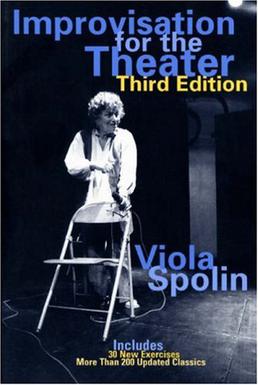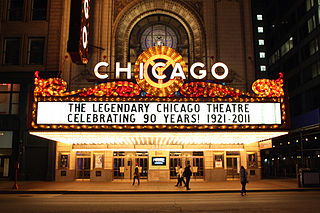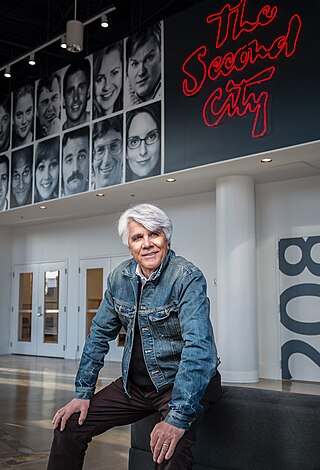
Improvisational theatre, often called improvisation or improv, is the form of theatre, often comedy, in which most or all of what is performed is unplanned or unscripted, created spontaneously by the performers. In its purest form, the dialogue, action, story, and characters are created collaboratively by the players as the improvisation unfolds in present time, without use of an already prepared, written script.

Mandel Bruce Patinkin is an American actor and singer, known for his work in musical theatre, television, and film. As a critically acclaimed Broadway performer he has collaborated with Stephen Sondheim and Andrew Lloyd Webber. Patinkin's leading roles on stage and screen have received numerous accolades including a Tony Award, a Primetime Emmy Award as well as nominations for seven Drama Desk Awards, three Golden Globe Awards, and a Screen Actors Guild Award.
The Compass Players was an improvisational theatre revue active from 1955 to 1958 in Chicago and St. Louis. Founded by David Shepherd and Paul Sills, it is considered to be the first improvisational theater in the United States.

The Apollo Theater is a multi-use theater at 253 West 125th Street in the Harlem neighborhood of Upper Manhattan in New York City. It is a popular venue for black American performers and is the home of the TV show Showtime at the Apollo. The theater, which has approximately 1,500 seats across three levels, was designed by George Keister with elements of the neoclassical style. The facade and interior of the theater are New York City designated landmarks and are listed on the National Register of Historic Places. The nonprofit Apollo Theater Foundation (ATF) operates the theater, as well as two smaller auditoriums at the Victoria Theater and a recording studio at the Apollo.
The Second City is an improvisational comedy enterprise. It is the oldest improvisational theater troupe to be continuously based in Chicago, with training programs and live theatres in Toronto and Los Angeles. The Second City Theatre opened on December 16, 1959, and has become one of the most influential and prolific comedy theatres in the English-speaking world. In February 2021, ZMC, a private equity investment firm based in Manhattan, purchased the Second City.

Viola Spolin was an American theatre academic, educator and acting coach. She is considered an important innovator in 20th century American theater for creating directorial techniques to help actors to be focused in the present moment and to find choices improvisationally, as if in real life. These acting exercises she later called Theater Games and formed the first body of work that enabled other directors and actors to create improvisational theater. Her book Improvisation for the Theater, which published these techniques, includes her philosophy and her teaching and coaching methods, and is considered the "bible of improvisational theater". Spolin's contributions were seminal to the improvisational theater movement in the U.S. She is considered to be the mother of Improvisational theater. Her work has influenced American theater, television and film by providing new tools and techniques that are now used by actors, directors and writers.

The New Amsterdam Theatre is a Broadway theater at 214 West 42nd Street, at the southern end of Times Square, in the Theater District of Manhattan in New York City. One of the first Broadway venues to open in the Times Square neighborhood, the New Amsterdam was built from 1902 to 1903 to designs by Herts & Tallant. The theater is operated by Disney Theatrical Productions and has 1,702 seats across three levels. Both the Beaux-Arts exterior and the Art Nouveau interior of the building are New York City landmarks, and the building is on the National Register of Historic Places.

The Ed Sullivan Theater is a theater at 1697–1699 Broadway, between 53rd and 54th Streets, in the Theater District of Midtown Manhattan in New York City. Built from 1926 to 1927 as a Broadway theater, the Sullivan was developed by Arthur Hammerstein in memory of his father, Oscar Hammerstein I. The two-level theater was designed by Herbert J. Krapp with over 1,500 seats, though the modern Ed Sullivan Theater was downsized to 370 seats by 2015. The neo-Gothic interior is a New York City landmark, and the building is on the National Register of Historic Places.

The Hayes Theater is a Broadway theater at 240 West 44th Street in the Theater District of Midtown Manhattan in New York City. Named for actress Helen Hayes, the venue is operated by Second Stage Theater. It is the smallest Broadway theater, with 597 seats across two levels. The theater was constructed in 1912 for impresario Winthrop Ames and designed by Ingalls & Hoffman in a neo-Georgian style. The original single-level, 299-seat configuration was modified in 1920, when Herbert J. Krapp added a balcony to expand the Little Theatre. The theater has served as a legitimate playhouse, a conference hall, and a broadcasting studio throughout its history.

Theater in Chicago describes not only theater performed in Chicago, Illinois, but also to the movement in Chicago that saw a number of small, meagerly funded companies grow to institutions of national and international significance. Chicago had long been a popular destination for touring productions, as well as original productions that transfer to Broadway and other cities. According to Variety editor Gordon Cox, beside New York City, Chicago has one of the most lively theater scenes in the United States. As many as 100 shows could be seen any given night from 200 companies as of 2018, some with national reputations and many in creative "storefront" theaters, demonstrating a vibrant theater scene "from the ground up". According to American Theatre magazine, Chicago's theater is "justly legendary".
Music Theater Works is a resident professional not-for-profit musical theatre company in Evanston, Illinois. It was founded in 1980 by Philip Kraus, Bridget McDonough, and Ellen Dubinsky.
Happy Happy Good Show was an improvisational comedy revue held at the Victory Gardens Studio Theater in Chicago during the summer of 1988. The cast and writers were largely made up of writers on strike from Saturday Night Live after the 1987–1988 season. The show is most notable for showcasing the performance talents of Bob Odenkirk, Robert Smigel, and Conan O'Brien, as the three had previously only showcased their writing talents. The revue was directed by Mark Nutter.
Sheldon Arthur Patinkin was a chair of the Theater Department of Columbia College Chicago, artistic director of the Getz Theater of Columbia College, Artistic Consultant of The Second City and of Steppenwolf Theatre and co-director of the Steppenwolf Theatre Summer Ensemble Workshops.
David Gwynne Shepherd was an American producer, director, and actor noted for his innovative work in improvisational theatre. He founded and/or co-founded the Playwrights Theatre Club, The Compass Players, the Canadian Improv Games, and the ImprovOlympic.
Lara Teeter is an American dancer, actor, singer, theater director and college professor.

Andrew Alexander is an English theatre and television producer best known for his previous leadership and co-ownership of The Second City, and co-developing and producing the television show SCTV.
The Playwright's Theatre Club was founded in Chicago, Illinois in 1953 by Paul Sills, David Shepherd and Eugene Troobnick. The theatre was noted for its original treatment and productions of classic plays as well as premiering original works, and was credited for the creation of The Compass Players and The Second City.

Village East by Angelika is a movie theater at 189 Second Avenue, on the corner with 12th Street, in the East Village of Manhattan in New York City. Part of the former Yiddish Theatre District, the theater was designed in the Moorish Revival style by Harrison Wiseman and built from 1925 to 1926 by Louis Jaffe. In addition to Yiddish theatre, the theater has hosted off-Broadway shows, burlesque, and movies. Since 1991, it has been operated by Angelika Film Center as a seven-screen multiplex. Both the exterior and interior of the theater are New York City designated landmarks, and the theater is on the National Register of Historic Places.



















